Dying with Dignity, Living with Love
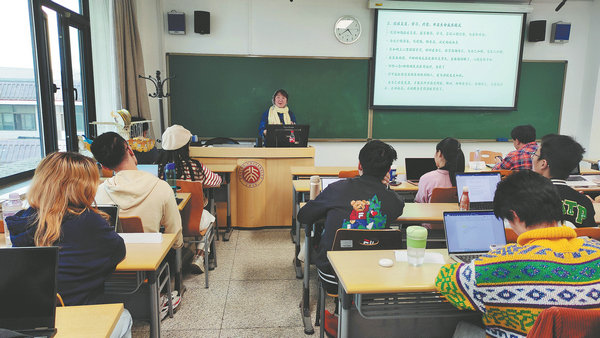 |
| Xu Shu delivers a lecture, in October, about her thoughts on death as a cancer patient and a hospice care volunteer at Peking University. [China Daily] |
A woman's experience of losing her mother and a cancer diagnosis launched a quest of understanding that ultimately inspired a journey to become a hospice volunteer and, consequently, an author, Yang Yang reports.
On July 6, 2019, 62-year-old Xu Shu came to the palliative care unit at Beijing Haidian Hospital, the Haidian Section of Peking University Third Hospital, as a volunteer photographer. She hesitated. She knew that on the hospice beds lay cancer patients who, with life expectancies of no more than six months, usually suffered from severe pain.
She knew how miserable they may look and sound.
Three years before, when her mother received chemotherapy, Xu heard the wailing of a terminal cancer patient at the same ward.
"It's so appalling. All the other patients became nervous when they heard the howling because that might also be their future," she recalls.
Her mom told her she'd rather die in a coma.
Xu's mother had lived with cancer for three years. But it was still hard for Xu to prepare for her unexpected death.
In her final days, her health deteriorated quickly. Xu didn't know what could be done at home. So, she sent her mom to the hospital.
It was a Sunday in mid-July. The ward's air conditioner was blowing cold blasts onto the bed to prevent cross infection. The nurse said nothing could be done about it.
The pharmacy didn't have opioids because it was the weekend. But Xu was still able to obtain transdermal patches that she thought could help her mother get through the night.
Before she drove her exhausted father home, she helped her mother lie down, covered her with a blanket and applied pain-relieving medicinal liquor on her dying purple toes. Her mom asked her to take good care of her father and said, "See you tomorrow".
Those were her last words.
Xu wanted to return to the hospital but was too tired. Thinking the nurses would attend to her mother, she fell asleep.
She returned early the next morning and was surprised to receive an official notice that her mother was in critical condition.
Xu rushed to her bedside. She found her mother couldn't move her facial muscles — and her hands were tied to the bed.
She asked her mom what had happened, but she could only move her head. A nurse explained "the patient" had been writhing in pain, so they'd secured her arms so she wouldn't disconnect the infusion tube. A night nurse had mistakenly peeled off the two transdermal patches, which no longer worked after they were reapplied.
"The pain was so intense that she had a stroke," she says.
Xu was devastated, thinking about how lonely, desperate and pain-stricken her mother was in that cold ward while she slept at home.
The hospital only allowed half-hour visits each day.
After the stroke, her mother was not able to say a word. And before Xu was ready, her mother died alone in the ICU.
When she rushed to the hospital, she found fluid was oozing from a hole in her mother's chest. But she recalled she'd told the doctor to not do any invasive procedures.
Xu was overcome with sorrow, regret, self-blame and despair. Half a year later, she was diagnosed with breast cancer.
She sent her father to an elder care center while she received treatment. And she and her husband spent the following year and a half traveling the world.
In Britain, she lay on a lawn outside a beautiful graveyard, where she found people appeared more relaxed when confronted with death. In Kenya, she saw beautiful wild animals and shot great memories with her camera.
But travel didn't allow her to entirely escape her sadness. She had to stop and contemplate her own death, "which is inevitable".
"If I wanted to continue traveling blithely, first, I needed to answer the question that kept coming to me: If my cancer progressed, where and how am I going to die? I don't want to undergo my mother's pain. I don't want to die at the hospital in lonely despair. I was wondering if there is any better way to die," she says.
"If, in the end, I get symptoms that can't be dealt with at home, where can I go to relieve the symptoms and die not so alone and helpless?"
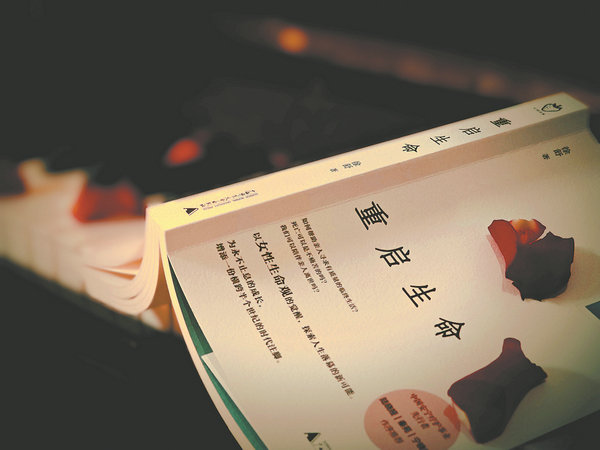 |
| The cover of Xu's Book Chongqi Shengming (Life Anew) that recorded her experiences and thoughts related to death, hospice care and life. [China Daily] |
Final Comforts
China's population is rapidly aging. In 2017, the National Health Commission released a guide for palliative care and a list of the first five pilot cities.
Beijing Haidian Hospital became one of China's first to provide professional palliative care in hematology and oncology in July of that year. And Qin Yuan, a professor of palliative care at the hospital, happened to live in the same apartment building as Xu's parents.
Xu learned for the first time about palliative care and the new unit at BHH from Qin's WeChat post: "At palliative care wards, terminal cancer patients can relieve pain and die with decency in the warm company of hospice caregivers, family members and friends."
In 2018, Xu drafted a will clarifying what medical care she doesn't want if she's terminally ill — intubation, treatment and examination that causes severe pain, to be kept alive in a vegetative state and so on.
In July 2019, Xu became a volunteer photographer for BHH's hospice. Before she stepped into the palliative care ward, her body tensed up when she thought of the miserable scenes she'd see.
She forced herself to go forward.
To her surprise, when she pushed open the door, she saw a sunny room where flowers were blooming in the small pots on the windowsill. She heard volunteers greet each patient warmly, and they responded with friendliness.
She saw a veteran volunteer holding a patient's hand, casting cherishing looks at him while talking with him. Other volunteers were helping patients wash and cut their hair, as if they were family or old friends.
There was no wailing, no unbearable suffering. Every patient seemed relaxed in the company of at least one family member.
Xu was amazed by such a warm scene, so full of love, but also felt confused at how the volunteers did what they did.
"The patients here were lucky. At the darkest times of their lives, there were people holding their hands, caring for them, loving them and accompanying them to face their deaths. They were safe. They were not lonely," she says.
Xu decided that she would receive palliative care at the end of her life. She at first volunteered as a caregiver out of selfish intentions — she wanted to secure a bed for herself in the future. And she also wanted to help those patients and to reduce her own guilt.
However, becoming a qualified palliative caregiver requires mastery of various kinds of knowledge.
They need proper training to better understand life and death from philosophical and psychological perspectives so that they won't fear death or feel too sad or frustrated when the patients they care for — and about — die.
"The lectures about life and death that I attended saved me. It helped me see my mother's death from a new perspective and rid myself of the deep sorrow, self-blame and depression I'd felt," she says.
"Death is not the end of a life but the start of a new journey. Such an idea helps console many people, including doctors who have to face many deaths every day."
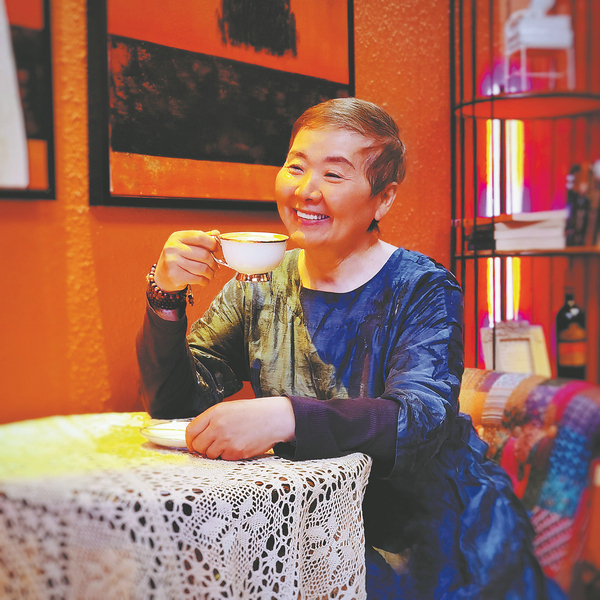 |
| Xu traveled to different places to see the world and take photos. She recalls the experiences as she enjoys a cup of tea in Kashgar, Xinjiang Uygur Autonomous Region. [China Daily] |
Xu also learned aromatherapy to massage concentrated plant-based oils onto patients' skin to help them relax and sleep.
Another important thing volunteers must learn is to express their care and love through eye contact and body language. For example, caregivers should look at patients with warm and determined eyes, and should hug people in a way that will let them feel secure and warm.
By studying, reading and practicing, Xu gradually mastered related knowledge and skills. She learned how to provide individualized care for patients to enable them to spend their final days in decency and comfort. In the end, peaceful deaths console both the dead and the living.
Xu recalls that a middle-aged patient whose mother kept asking nurses to change his bed sheets.
"She was very rude. Later, we learned that her son used to be a very clean person but hadn't been able to bathe for months after falling ill because his skin hurt. The mother felt like changing the bedsheets was all she could do for him," she recalls.
So, Xu and another volunteer offered to give him aromatherapy. To persuade his mother, they first tried it on one leg.
They applied essential oils on his limb, and massaged it very carefully and gently. The dead skin came off without hurting him. The mother burst into tears and became friendly toward them from then on. The three later performed aromatherapy on his whole body together.
"Every patient is my teacher," Xu says.
"At the palliative care unit, I learned to respect every life that will soon pass on. They inspired me to think about the value and meaning of life, and to reflect on my own."
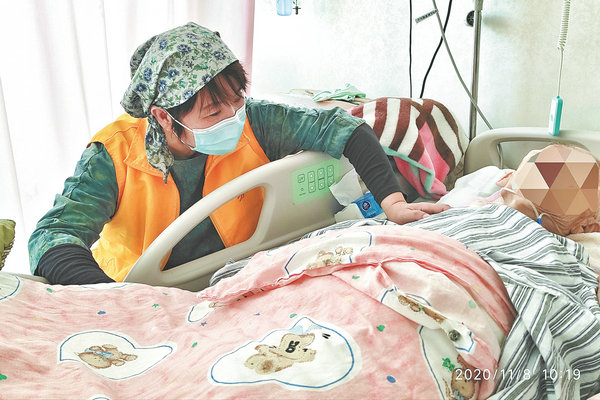 |
| From 2020 to 2022, Xu volunteered to look after cancer patients in the palliative care unit of Beijing Haidian Hospital. [China Daily] |
Life Before Death
Xu started to re-examine her life, and, in particular, her relationships with her parents, husband and daughter.
She stopped being a people pleaser. She readjusted her relationships with her family. She reconciled with her mother in her mind and, most importantly, learned to talk to, admire and cherish herself.
When her cancer returned, she found she didn't fear death anymore.
"Death is as saintly as birth. I'm completely in awe of and obedient to it," she says.
"Death can come at any time. Then, I will be happy to go. But now, I will live each day well."
When her mother was terminally ill, Xu did not know what to do at home, so she had to send her to the hospital, leaving her to die alone there. When her father, who had Parkinson's and Alzheimer's, reached his last period of life, she knew what to do. And when she was not sure, she turned to Qin and Professor Ning Xiaohong from the palliative care unit of Peking Union Medical College Hospital.
"When a family member is going to die, be generous and give him or her more love, even if it's just your touch or hugs, which are better than a thousand words," she says.
"Let them feel how you really love and cherish them. And they'll leave this world surrounded by your love."
Chinese people of her father's generation are, in general, not used to affectionate touching and hugs, and typically feel embarrassed when their children tell them they love them.
Bit by bit, Xu brought her father to accept all her expressions of love through words and body language. She also help him imagine, through visualization, the fulfillment of wishes related to major life concerns like education, family and career.
In the end, he died peacefully, with her by his side.
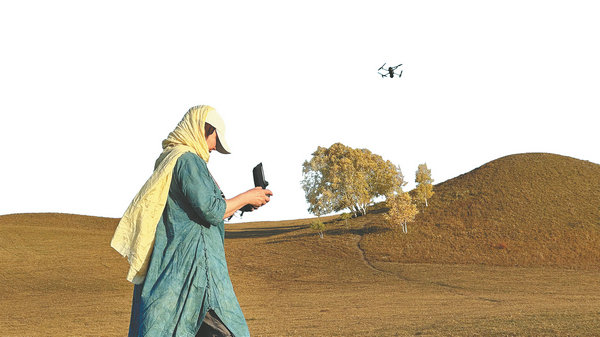 |
| Xu's experience as a hospice volunteer encouraged her to reflect on her life and she started doing things she was interested in. She learned to take photos with drones and in September Xu operated a drone over a prairie in Chifeng, Inner Mongolia Autonomous Region. [China Daily] |
Xu felt pleased that she could use her knowledge to help him through this process.
She wrote an essay reflecting on her mother's and father's deaths, and her own very different experiences and feelings. She sent it to Qin and Ning as a kind of summary of what she'd learned and practiced. Ning encouraged Xu to share her experiences with more volunteers, since the contrast between her parents' deaths was too stark.
After she shared her stories with them, she was invited to write a book.
Last year, Chongqi Shengming (Life Anew) was published by Guangxi Normal University Press.
Starting from her early life, Xu tells her stories about dealing with life and death in concise language.
The book is rated 8.8 out of 10 on the major Chinese review site, Douban. Many readers comment that they're inspired by the writer's thoughts on life and death, and knowledge about palliative care.
Beijing Haidian Hospital has increased its palliative care beds from six to 50. According to a municipal plan, by 2025, every community in Beijing will build a hospice center with at least 50 beds, which adds up to more than 1,800 citywide.
An old Chinese saying goes: "You can't know life before you know death." Xu says she rediscovered her life at age 62.
Today, she's learning to use drones to take photos of the world's most splendid views. She prints some of these travel photos and brings them to the hospital's palliative care unit.
"Patients there will choose the ones they love and hang them in front of their beds," she says.
"I'm happy to give them some warmth in this way."
(Source: China Daily)
Please understand that womenofchina.cn,a non-profit, information-communication website, cannot reach every writer before using articles and images. For copyright issues, please contact us by emailing: website@womenofchina.cn. The articles published and opinions expressed on this website represent the opinions of writers and are not necessarily shared by womenofchina.cn.








.jpg)

 WeChat
WeChat Weibo
Weibo 京公网安备 11010102004314号
京公网安备 11010102004314号